Shinzo Abe shot dead Japan's former PM is assassinated
This is the shocking moment former Japanese prime minister Shinzo Abe was shot dead - revealing how oblivious security guards tried to block bullets with their briefcases after realising too late that he was under attack.
Cameras trained on Abe as he gave a political stump speech in the city of Nara at 11.30am captured the moment the first shot was fired, missing the politician but producing a loud bang and a cloud of smoke.
For what feels an eternity, but in reality is just a few seconds, Abe remains on his podium as bewildered guards - who were all looking at him as he spoke - turn around and finally grasp what is happening, just a moment too late.
Panicked, they try to put themselves between Abe and 41-year-old gunman Tetsuya Yamagami, with one even flinging his briefcase in a lame attempt to stop what they all know is coming.
Abe turns too, and may have caught sight of his attacker for the briefest of moments before the second fatal shot is fired: Causing his shirt-front to ripple as pellets tear into his neck and chest, burying themselves in his heart.
He is not immediately knocked unconscious, but stumbles off the stump and collapses to his knees before slumping over. Guards run to his side, and later images show how they began chest compressions in a vain attempt to revive him. He died several hours later in hospital from massive blood loss.
Yamagami was tackled to the ground and arrested, with police saying he has confessed - telling them he wanted to kill Abe because he was a member of a 'specific organisation' that he disagreed with.
Police say Yamagami had amassed an arsenal of home-made weapons similar to the one used in the attack at his home, along with a number of explosives which have been taken to be destroyed.
It is not clear exactly how he learned to make the weapons, but he is a veteran of the country's defence forces, having served in the navy between 2002 and 2005.
Yamagami is currently unemployed and had travelled to Nara by train, lying in wait at the station where Mr Abe was due to give his speech before launching the attack. Cops have not said how long he waited.
A chilling image taken just moments before Abe was killed shows Yamagami - an unassuming figure in a green t-shirt and cargo trousers - loitering just behind him.
Mr Abe was a towering figure in Japanese politics: Serving two terms from 2006 to 2007, and then again from 2012 until poor health forced him to resign in 2020. He remained hugely influential within the Liberal Democratic Party even after office, and was in Nara to support the local candidate ahead of Sunday's ballot.
Current Prime Minister Fumio Kishida called the shooting an attack on 'the foundation of democracy', describing it as 'heinous', 'barbaric and malicious', and 'absolutely unforgivable'. 'I would like to use the most extreme words available to condemn this act,' he added.
Video taken shortly before the shooting shows Abe arriving at the scene and greeting people before Yamagami steps out from behind a banner.
He walks behind the politician as he starts speaking before pulling the weapon from his bag and firing the first shot. It appears to miss Abe, who turns to look before the second fatal shot is fired.
Abe's legacy will stand as perhaps the most significant of Japan's post-war leaders - a hawkish conservative and economic reformer who dragged the country out of decades of stagnant economic growth and made it a power player on the world stage.
Born into a political dynasty, Abe's grandfather and great uncle had both served as prime minister before him and he was groomed for power from the start.
He first became premiere in 2006 at the age of 52 - the youngest ever to hold the job - but was mired in scandal and abruptly stepped down after just a year while suffering debilitating the bowel condition ulcerative colitis.
He regained the premiership in 2012 and held the role for the next eight years - making him Japan's longest-serving prime minister - before he was forced to step down again in 2020 when the bowel condition reemerged.
Abe is best-known for his 'Abenomics' agenda to revive Japan's sluggish economy via a programme of vast government spending, massive monetary easing, and cutting red tape.
But he also pushed for reforms of Japan's pacifist post-war constitution to allow the country to develop a fully-fledged military, and deepened ties with western allies - particularly with the US.
UK Prime Minister Boris Johnson led tributes to Abe as news of his death spread on Friday, saying: 'His global leadership through unchartered times will be remembered by many.
'My thoughts are with his family, friends, and the Japanese people. The UK stands with you at this dark and sad time.'
The attack came just before noon in the country's western region of Nara, where Abe had been delivering a stump speech with security present, but spectators were able to approach him easily.
Footage broadcast by NHK showed him standing on a stage when a man dressed in a grey shirt and brown trousers begins approaching from behind, before drawing something from a bag and firing.
At least two shots appeared to be fired, each producing a cloud of smoke.
As spectators and reporters ducked, a man was shown being tackled to the ground by security. He was later arrested on suspicion of attempted murder, reports said.
Local media identified the man as 41-year-old Tetsuya Yamagami, citing police sources, with several media outlets describing him as a former member of the Maritime Self-Defense Force, the country's navy.
He was wielding a weapon described by local media as a 'handmade gun', and NHK said he told police after his arrest that he 'targeted Abe with the intention of killing him'.
Witnesses at the scene described shock as the political event turned into chaos.
'The first shot sounded like a toy bazooka,' a woman told NHK.
'He didn't fall and there was a large bang. The second shot was more visible, you could see the spark and smoke,' she added.
'After the second shot, people surrounded him and gave him cardiac massage.'
Abe was bleeding from the neck, witnesses said and photographs showed. He was reportedly initially responsive but subsequently lost consciousness.
Officials from the local chapter of Abe's Liberal Democratic Party said there had been no threats before the incident and that his speech had been announced publicly.
Kishida said 'no decision' had been made on the election, though several parties announced their senior members would halt campaigning in the wake of the attack.
The attack prompted international shock.
'This is a very, very sad moment,' US Secretary of State Antony Blinken told reporters at a G20 meeting in Bali, saying the United States was 'deeply saddened and deeply concerned'.
Thailand's Prime Minister Prayut Chan-O-Cha was 'very shocked' at Abe's shooting, while Indian Prime Minister Narendra Modi said he was 'deeply distressed' by the news.
Abe, Japan's longest-serving prime minister, held office in 2006 for one year and again from 2012 to 2020, when he was forced to step down due to the debilitating bowel condition ulcerative colitis.
He was a hawkish conservative who pushed for the revision of Japan's pacifist constitution to recognise the country's military and has stayed a prominent political figure even after his resignation.
Japan has some of the world's toughest gun-control laws, and annual deaths from firearms in the country of 125 million people are regularly in single figures.
Getting a gun licence is a long and complicated process for Japanese citizens, who must first get a recommendation from a shooting association and then undergo strict police checks.
Japan has seen 'nothing like this for well over 50 to 60 years', Corey Wallace, an assistant professor at Kanagawa University who focuses on Japanese politics, told AFP.
He said the last similar incident was likely the 1960 assassination of Inejiro Asanuma, the leader of the Japan Socialist Party, who was stabbed by a right-wing youth.
'But two days before an election, of a (man) who is so prominent... it's really profoundly sad and shocking.'
He noted, too, that Japanese politicians and voters are used to a personal and close-up style of campaigning.
Abe, Japan's longest-serving prime minister, held office in 2006 for one year and again from 2012 to 2020, when he was forced to step down due to the debilitating bowel condition ulcerative colitis.
He stepped down as prime minister in 2020 because he said a chronic health problem has resurfaced.
Abe has had ulcerative colitis since he was a teenager and has said the condition was controlled with treatment
-
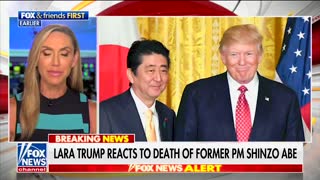 4:56
4:56
Brian Kilmeade
1 year agoFormer Japanese Prime Minister Shinzo Abe Assassinated
2.15K32 -
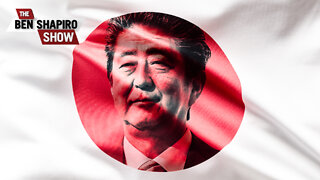 36:50
36:50
Ben Shapiro
1 year agoFormer Japanese Prime Minister Shinzo Abe Murdered | Ep. 1530
7.96K52 -
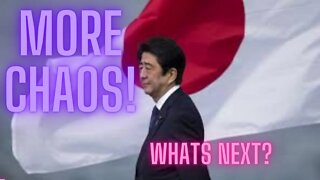 9:11
9:11
The Economic Ninja
1 year agoFormer Japanese PM Shinzo Abe Showing No Vital Signs After Apparent Assassination Attempt
3841 -
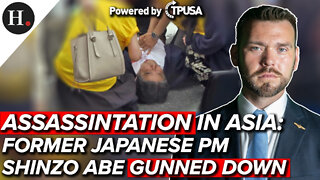 22:19
22:19
Human Events Daily Archive
1 year agoJUL 8, 2022 - ASSASSINATION IN ASIA: FORMER JAPANESE PM SHINZO ABE GUNNED DOWN OUTSIDE TRAIN STATION
1.95K11 -
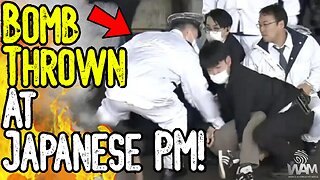 9:43
9:43
World Alternative Media
1 year agoBREAKING: Bomb Thrown At Japanese Prime Minister! - ASSASSINATION ATTEMPT!
7725 -
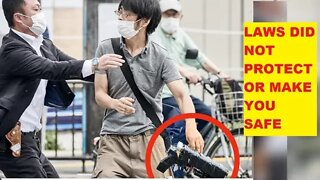 10:56
10:56
Good Luck America
1 year agoHomemade Gun That Shot Japanese Prime Minister Shinzo Abe - Laws Did Not Save Anyone
7952 -
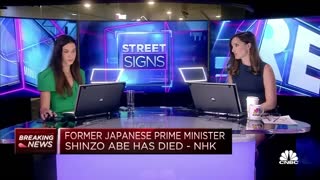 1:50
1:50
dfjdaayyka
1 year agoFormer Japanese Prime Minister Shinzo Abe has died
-
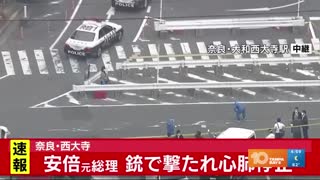 1:05
1:05
loasoacpsf
1 year agoShinzo Abe, former Japan prime minister and longest-serving leader, dead after being shot in attack
15.5K1 -
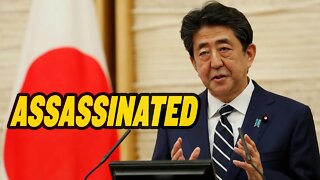 13:47
13:47
America Uncovered
1 year agoJapan’s Pro-Taiwan Former PM Shinzo Abe Assassinated
2021 -
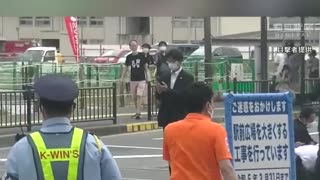 1:21
1:21
dfjdaayyka
1 year agoFormer Japanese prime minister Shinzo Abe dies after being shot
12